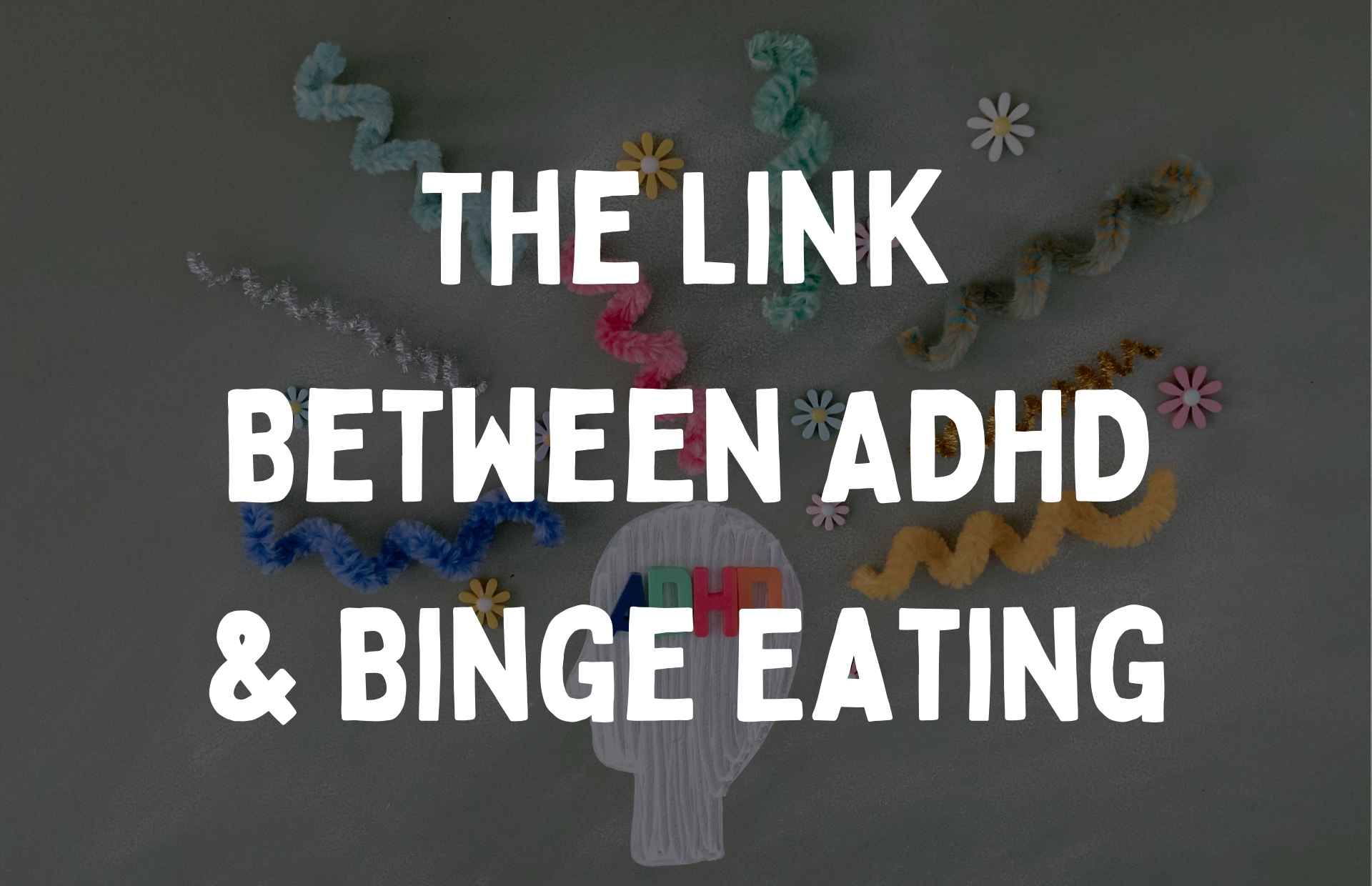

The Link Between ADHD And Binge Eating
When we think of ADHD (Attention Deficit Hyperactivity Disorder), our minds often jump to restlessness, a short attention span, and forgetfulness. But what if I told you there?s a deeper connection between ADHD and eating habits?specifically binge eating?
For many women struggling with both conditions, the link is real, and understanding it can be the first step toward healing.
In my years as a nutritionist, I?ve worked with hundreds of women, many of whom battle binge eating. A notable number of them also struggle with ADHD. This isn?t just a coincidence. There?s a surprising overlap between the two, and today we?re diving into why that is and how recognising this link can help in recovery.
What Is ADHD?
ADHD is a neurodevelopmental disorder that affects both children and adults. It?s characterised by symptoms like inattention, impulsivity, and hyperactivity. But ADHD doesn?t just influence behaviour?it affects emotional regulation, decision-making, and, yes, eating patterns.
I remember working with one client (we'll call her, Sarah), who struggled with binge eating and severe ADHD. She told me that managing her ADHD felt like trying to herd cats. Her thoughts were scattered, and she always struggled to stay focused and pay attention during our calls together. She often said that she'd be distracted by something, and she wouldn't even realise that she was eating until she'd finished half a bag of crisps.
For Sarah and many others, ADHD?s impulsivity doesn?t just impact their actions ? it affects their relationship with food. And whilst I've worked with dozens of women like Sarah, I've also worked with many more with less severe ADHD who also struggle with binge eating.

What Is Binge Eating?
Binge eating involves consuming large amounts of food in a short period while feeling out of control. It?s not just overeating; it?s eating past the point of fullness, often to the point of discomfort. Afterwards, feelings of guilt and shame usually follow.
Although I personally don't struggle with ADHD, I?ve had my own history of binge eating. I spent my teen years and early twenties regularly bingeing. There were moments when I?d find myself in front of an empty plate, asking, ?How did I get here?? It wasn?t about hunger, and it wasn?t about enjoyment. It was about something deeper?something emotional.
For women like Sarah, who also struggle with ADHD, binge eating isn?t just a result of poor eating habits. It?s often a coping mechanism for managing the emotional dysregulation that comes with ADHD.
How ADHD and Binge Eating Are Linked
The ADHD-binge eating link can be traced back to a few key factors:
Impulsivity
One of the hallmarks of ADHD is impulsivity?making snap decisions without fully considering the consequences. For someone with ADHD, this impulsivity can show up in their eating habits. Instead of pausing to ask, ?Am I hungry??, they might dive headfirst into food without realising it.
I?ve worked with clients who tell me they don?t even remember reaching for food. It's not uncommon for people to find themselves standing in front of the fridge or pantry, eating whatever they can find without any real thought. One of my clients described this perfectly to me. She said, ?It?s like I blink, and suddenly, I?m halfway through a loaf of bread.?
This isn?t uncommon for those with ADHD. Their brains are wired to act first and think later, and food becomes an easy outlet for that impulsive behaviour.
Emotional Dysregulation
Another key component of ADHD is emotional dysregulation, which means difficulty managing intense emotions. For many women with ADHD, food becomes a way to self-soothe during emotional highs and lows. Whether it?s stress, frustration, or even boredom, food becomes a temporary escape.
I?ve seen this time and time again with my clients. Many of them would have a stressful day at work and then find themselves binging on every sugary snack in the house when they get home. One client, Amanda, told me, ?It?s like I need the sugar to calm me down?.
And it?s true?sugar can give a quick dopamine hit, which feels like a short-term fix for emotional turmoil. The problem is, that relief is temporary, and it?s often followed by regret.
Dopamine and Reward Systems
Speaking of dopamine, let?s talk science for a second. ADHD is linked to lower levels of dopamine, the ?feel-good? chemical that plays a big role in motivation and reward. Because of this, people with ADHD often seek out activities that give them a quick dopamine boost?whether it?s through risky behaviours, video games, or, yes, food.
Food, especially highly processed and sugary foods, gives an immediate dopamine hit. It?s one reason why binge eating can become such an addictive habit for those with ADHD.
As previously mentioned, many of my clients with ADHD would binge on sugary foods like chocolate after a tough day. This dopamine-driven behaviour creates a cycle of bingeing, brief satisfaction, and then shame, which can be incredibly difficult to break.

ADHD Medications and Appetite Suppression
Interestingly, many ADHD medications, such as stimulants like Adderall or Ritalin, come with a side effect?appetite suppression. While this might sound like it would help with overeating, it can actually create a new problem.
When someone?s appetite is suppressed throughout the day due to medication, they might skip meals or not eat enough. Then, as the medication wears off later in the day, they suddenly find themselves ravenous. This can lead to binge eating in the evening, as the body tries to make up for the missed meals earlier.
This pattern can easily turn into a cycle of restricting and bingeing, which only adds to the emotional distress.
Breaking the ADHD-Binge Eating Cycle
While the link between ADHD and binge eating might seem overwhelming, there are ways to break the cycle. With the right strategies, you can manage both your ADHD symptoms and your relationship with food. Below I'll talk about some key strategies people with ADHD can employ to help them stop binge eating.
Mindful Eating
For many of the women I work with, mindful eating has been a key tool in overcoming binge eating, especially for those with ADHD. Mindful eating involves paying full attention to the experience of eating?tuning into the taste, texture, and the signals your body sends when it?s full.
Sarah, the client I mentioned earlier, really benefited from practising mindful eating. She found that by removing all distractions and focussing on being present with her food, she was able to massively reduce her binge episodes.
Routine and Structure
People with ADHD tend to thrive with structure, and this applies to eating habits too. Creating a consistent meal schedule can help reduce impulsive eating. Having regular meals and snacks planned throughout the day can prevent the urge to binge later.
I often recommend that my clients with ADHD set alarms or reminders for meals and snacks. This is as simple as setting daily meal reminders on your phone that go off a few times per day for main meals, snacks etc.
By planning ahead and setting reminders, you'll be able to avoid those moments of extreme hunger that often lead to binge eating.
Dopamine-Boosting Activities
Since ADHD is linked to low dopamine levels, it?s important to find healthy ways to boost dopamine that don?t involve food. Exercise, for example, is a great way to increase dopamine levels naturally. Even simple activities like going for a walk, dancing, or stretching can help elevate your mood and reduce the urge to binge.
A few of my clients have found that incorporating a daily walk into their routine makes a huge difference. Rather than reaching for snacks when they're bored or stressed, they just go for a quick walk instead to clear their heads. This helps to break the emotional dependence on food and gives you a new outlet for stress relief.
Other activities like listening to music, engaging in hobbies, or practising mindfulness can also provide that much-needed dopamine boost without turning to food.
Managing Emotional Dysregulation
Addressing emotional regulation is crucial for anyone with ADHD who struggles with binge eating. Cognitive behavioural therapy (CBT) is one effective way to work on managing emotions and changing the thought patterns that lead to impulsive eating.
One of the key things I do when helping my clients stop binge eating is identify triggers that lead to them binge eating. Once we know these main triggers, we can then test out other healthier coping mechanisms.
For example, if we find that someone binges whenever they look in the mirror and don't like what they see (i.e., bad body image), I might suggest immediately showering and putting on a face mask. This can help you to feel a little 'less disgusting', and can also snap you out of the emotional path you just started walking down.
It?s essential to get to the root of emotional eating, especially for women with ADHD, who might be using food as a way to cope with overwhelming feelings.

The Dangers of Ignoring the ADHD-Binge Eating Link
If left unchecked, the combination of ADHD and binge eating can lead to serious physical and mental health consequences. Continually bingeing can result in weight gain, which increases the risk of conditions like Type 2 diabetes, heart disease, and high blood pressure. For women with ADHD, the impulsive behaviours and emotional dysregulation that fuel binge eating can also worsen over time if not addressed.
Additionally, the emotional toll of binge eating, such as feelings of shame, guilt, and low self-esteem, can be even more damaging than the physical effects. Many of my clients describe feeling ?trapped? in the binge eating cycle, which only exacerbates their ADHD symptoms. It?s a vicious cycle that can be hard to break without proper intervention.
One of the most challenging aspects of my own journey with binge eating was the emotional aftermath. I often felt like I had failed after binge or emotional eating, which only fueled the next binge. It took a lot of self-compassion and patience to break that cycle, and I?ve seen many women go through similar struggles.
For those with ADHD, acknowledging the link between their condition and binge eating is the first step toward healing.
The Road to Recovery
Recovery from binge eating is possible, even for women with ADHD. It might take time, patience, and a combination of different strategies, but it can be done.
Work With a Professional
For people with ADHD, working with a nutritionist or dietician who understands both conditions can be incredibly helpful. As someone who?s helped hundreds of women to successfully stop binge eating, I?ve seen firsthand how combining emotional support with practical strategies can make all the difference.
That's exactly why you get a dedicated coach during the Unidiet Binge Eating Recovery Program. You'll have weekly calls with this coach and you'll also be able to chat via voice and text message whenever you need support outside of your calls. And the best part?
Your coach is a qualified nutritionist/dietician and binge eating specialist.
Medication and ADHD Management
For some women, managing ADHD through medication can also have a positive effect on their eating habits. ADHD medications can help reduce impulsivity and emotional dysregulation, making it easier to stick to a mindful eating routine.
That being said, it?s important to monitor the side effects of any medication, such as appetite suppression or mood swings. Working closely with a doctor to find the right balance is key.
Building a Support System
Lastly, having a strong support system can make a world of difference. Whether it?s family, friends, or a support group, surrounding yourself with people who understand what you?re going through can help keep you motivated and accountable.
I personally believe that the Undiet Community is the best place to be for women who struggle with binge eating. Within the community, you'll find other women who are also working to stop binge eating. You'll also have access to qualified Nutritionists and Dieticians within the community.
It?s comforting to know that you?re not alone in your struggles, and connecting with others can provide much-needed emotional support.

Final Thoughts
The link between ADHD and binge eating is complex, but recognising that connection is a powerful first step. By understanding how ADHD affects eating habits, women can start to break free from the binge eating cycle and regain control over their relationship with food.
If you?re struggling with both ADHD and binge eating, remember that you?re not alone. There are strategies, professionals, and communities that can help you along the way. Recovery might be challenging, but with the right support, it?s absolutely achievable.
And from personal experience, I can tell you this: the journey to finding balance with food is worth it. It?s not about perfection?it?s about progress and learning to listen to your body and mind, one step at a time.